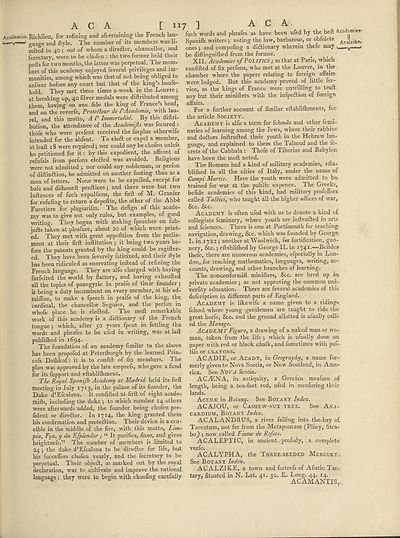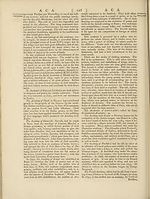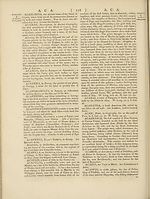Encyclopaedia Britannica, or, a Dictionary of arts, sciences, and miscellaneous literature : enlarged and improved. Illustrated with nearly six hundred engravings > Volume 1, A-AME
(135) Page 117
Download files
Complete book:
Individual page:
Thumbnail gallery: Grid view | List view

A C A [ii'
Academies. RichlieU, for refining and afcertaining ihe French lan-
u—y guage and ftyle. The number of its members was li¬
mited to 40 ; out of whom a dire&or, chancellor, and
fecretary, were to be chofen : the two former held their
pofts for two months, the latter was perpetual. The mem¬
bers of this academy enjoyed feveral privileges and im¬
munities, among which was that of not being obliged to
anfwer before any court but that of the king’s houfe-
hold. They met three times a-week in the Louvre •,
at breaking up, 40 filver medals were diftributed among
them, having on one fide the king of France’s head,
and on the reverfe, Prote&eur de l'Academic, with^ lau¬
rel, and this motto, A /’ Immortalite. By this diftri-
bution, the attendance of the Academijis was fecured .
thofe who were prefent received the furplus otherwife
intended for the abfent. To eleft or expel a member,
at lead 18 were required; nor could any be chofen unlefs
he petitioned for it: by this expedient, the affiont of
refufals from perfons ele&ed was avoided. Religious
were not admitted •, nor could any nobleman, or perfon
of diftin&ion, be admitted on another footing than as a
man of letters. None were to be expelled, except for
bafe and dilhoneft praftices; and there were but two
inftances of fuch expulfions, the firft of M. Granier
for refufing to return a depofite, the other of the Abbe
Furetiere for plagiarifm. The defign of this acade¬
my was to giy® not only rules, but examples, of good
writing. They began with making fpeeches on fub-
je£ls taken at pleafure, about 20 of which were print¬
ed. They met with great oppofition from the parlia¬
ment at their firlt inftitution ; it being two years be¬
fore the patents granted by the king could be regifter-
ed. They have been feverely fatirized, and their ftyle
has been ridiculed as enervating inftead of refining the
French language. They are alfo charged with having
furfeited the world by flattery, and having exhaufted
all the topics of panegyric in praife of their founder ;
k being a duty incumbent on every member, at his ad-
miflion, to make a fpeech in praife of the king, the
cardinal, the chancellor Seguier, and the perfon in
whofe place he is ele&ed. The moft remarkable
work of this academy is a di&ionary of the French
tongue ; which, after 50 years fpent in fettling the
words and phrafes to be ufed in writing, was at laft
publilhed in 1694.
The foundation of an academy fimilar to the above
has been propofed at Peterlhurgh by the learned Prin-
cefs Daftikof: it is to confift of 60 members. The
plan was approved by the late emprefs, who gave a fund
for its fupport and eftablifliment.
The Royal Spanijh Academy at Madrid held its firft
meeting in July 1713, in the palace of its founder, the
Duke d’Efcalona. It confifted at firft of eight acade-
mifts, including the duke ; to which number 14 others
were afterwards added, the founder being chofen pre-
fident or diredlor. In 1714, the king granted them
his confirmation and protedHom Their device is a cru¬
cible in the middle of the fire, with this motto, Lim-
pia, Fya, y da Efplendor ; “ It purifies, fixes, and gives
brightnefs.” The number of members is limited to
24 5 the duke d’Efcalona to be director for life, but
his fucceflbrs chofen yearly, and the fecretary to be
perpetual. Their objeift, as marked out by the royal
declaration, was to cultivate and improve the national
language; they were to begin with choofing carefully
r ] a c A
fuch words and phrafes as have been ufed by the beft Acadamie*
Spanilh writers *, noting the low, barbarous, or obfolete Ac^zi]ce,
ones j and compofing a didlionary wherein thefe may >
be diftinguilhed from the former.
XII. Academies of POLITICS ; as that at Paris, which
confifted of fix perfons, who met at the Louvre, in the
chamber where the papers relating to foreign affairs
were lodged. But this academy proved of little fer-
vice, as the kings of France were unwilling to truft
any but their minifters with the infpe&ion of foreign
affairs.
For a further account of fimilar eftablilhments, fee
the article Society.
Academy is alfo a term for fchools and other femi-
naries of learning among the Jews, where their rabbins
and doftors inftrufted their youth in the Hebrew lan¬
guage, and explained to them the Talmud and the fe-
crets of the Cabbala : Thofe of Tiberias and Babylon
have been the moft noted.
The Romans had a kind of military academies, efta-
blilhed in all the cities of Italy, under the name of
Campi Martis. Here the youth were admitted to b&
trained for war at the public expence. The Greeks,
befide academies of this kind, had military profeffors
called TaSiici, who taught all the higher offices of wrar,
&c. &c.
Academy is often ufed with us to denote a kind of
collegiate feminary, where youth are inftru&ed in arts
and fciences. There is one at Portfmouth for teaching
navigation, drawing, &c. which was founded by George
L in 1722 \ another at Woolwich, for fortification, gun¬
nery, &c.; eftabliffied by George II. in 1741.—Befides*
thefe, there are numerous academies, efpecially in Lon¬
don, for teaching mathematics, languages, writing, ac¬
counts, drawing, and other branches of learning.
The nonconformift minifters, &c. are bred up in
private academies j as not approving the common uni-
verfity education. There are feveral academies of this
defcription in different parts of England.
Academy is likewife a name given to a riding-
fchool where young gentlemen are taught to ride the
great horfe, &c. and the ground allotted is ufually call¬
ed the Manege.
Ac ALE MT Figure, a drawing of a naked man or wo¬
man, taken from the life ; which is ufually done on
paper with red or black chalk, and fometimes with paf-
tils or CRAYONS..
ACADIE, or Acady, in Geography, a name for¬
merly given to Nova Scotia, or New Scotland, in Ame¬
rica. See NOVA Scotia.
ACALNA, in antiquity, a Grecian meafure of
length, being a ten-feet rod, ufed in meafuring their
lands.
Acena: in Botany. See Botany Index.
ACAJOU, or Cashew-nut tree. See Ana-
cardium, Botany Index.
ACALANDRUS, a river falling into the bay o£
Tarentum, not far from the Metapontum (Pliny, Stra¬
bo^) } now called Fiume de Rofeto.
ACALEPTIC, in ancient profody, a complete
verfe.
ACALYPHA, the Three-seeded Mercury.
See Botany Index.
ACALZIKE, a town and fortrefs of Afiatic Tar-,
tary, fituated in N. Lat. 41. 30. E. Long. 44. 14.
ACAMANTIS,
Academies. RichlieU, for refining and afcertaining ihe French lan-
u—y guage and ftyle. The number of its members was li¬
mited to 40 ; out of whom a dire&or, chancellor, and
fecretary, were to be chofen : the two former held their
pofts for two months, the latter was perpetual. The mem¬
bers of this academy enjoyed feveral privileges and im¬
munities, among which was that of not being obliged to
anfwer before any court but that of the king’s houfe-
hold. They met three times a-week in the Louvre •,
at breaking up, 40 filver medals were diftributed among
them, having on one fide the king of France’s head,
and on the reverfe, Prote&eur de l'Academic, with^ lau¬
rel, and this motto, A /’ Immortalite. By this diftri-
bution, the attendance of the Academijis was fecured .
thofe who were prefent received the furplus otherwife
intended for the abfent. To eleft or expel a member,
at lead 18 were required; nor could any be chofen unlefs
he petitioned for it: by this expedient, the affiont of
refufals from perfons ele&ed was avoided. Religious
were not admitted •, nor could any nobleman, or perfon
of diftin&ion, be admitted on another footing than as a
man of letters. None were to be expelled, except for
bafe and dilhoneft praftices; and there were but two
inftances of fuch expulfions, the firft of M. Granier
for refufing to return a depofite, the other of the Abbe
Furetiere for plagiarifm. The defign of this acade¬
my was to giy® not only rules, but examples, of good
writing. They began with making fpeeches on fub-
je£ls taken at pleafure, about 20 of which were print¬
ed. They met with great oppofition from the parlia¬
ment at their firlt inftitution ; it being two years be¬
fore the patents granted by the king could be regifter-
ed. They have been feverely fatirized, and their ftyle
has been ridiculed as enervating inftead of refining the
French language. They are alfo charged with having
furfeited the world by flattery, and having exhaufted
all the topics of panegyric in praife of their founder ;
k being a duty incumbent on every member, at his ad-
miflion, to make a fpeech in praife of the king, the
cardinal, the chancellor Seguier, and the perfon in
whofe place he is ele&ed. The moft remarkable
work of this academy is a di&ionary of the French
tongue ; which, after 50 years fpent in fettling the
words and phrafes to be ufed in writing, was at laft
publilhed in 1694.
The foundation of an academy fimilar to the above
has been propofed at Peterlhurgh by the learned Prin-
cefs Daftikof: it is to confift of 60 members. The
plan was approved by the late emprefs, who gave a fund
for its fupport and eftablifliment.
The Royal Spanijh Academy at Madrid held its firft
meeting in July 1713, in the palace of its founder, the
Duke d’Efcalona. It confifted at firft of eight acade-
mifts, including the duke ; to which number 14 others
were afterwards added, the founder being chofen pre-
fident or diredlor. In 1714, the king granted them
his confirmation and protedHom Their device is a cru¬
cible in the middle of the fire, with this motto, Lim-
pia, Fya, y da Efplendor ; “ It purifies, fixes, and gives
brightnefs.” The number of members is limited to
24 5 the duke d’Efcalona to be director for life, but
his fucceflbrs chofen yearly, and the fecretary to be
perpetual. Their objeift, as marked out by the royal
declaration, was to cultivate and improve the national
language; they were to begin with choofing carefully
r ] a c A
fuch words and phrafes as have been ufed by the beft Acadamie*
Spanilh writers *, noting the low, barbarous, or obfolete Ac^zi]ce,
ones j and compofing a didlionary wherein thefe may >
be diftinguilhed from the former.
XII. Academies of POLITICS ; as that at Paris, which
confifted of fix perfons, who met at the Louvre, in the
chamber where the papers relating to foreign affairs
were lodged. But this academy proved of little fer-
vice, as the kings of France were unwilling to truft
any but their minifters with the infpe&ion of foreign
affairs.
For a further account of fimilar eftablilhments, fee
the article Society.
Academy is alfo a term for fchools and other femi-
naries of learning among the Jews, where their rabbins
and doftors inftrufted their youth in the Hebrew lan¬
guage, and explained to them the Talmud and the fe-
crets of the Cabbala : Thofe of Tiberias and Babylon
have been the moft noted.
The Romans had a kind of military academies, efta-
blilhed in all the cities of Italy, under the name of
Campi Martis. Here the youth were admitted to b&
trained for war at the public expence. The Greeks,
befide academies of this kind, had military profeffors
called TaSiici, who taught all the higher offices of wrar,
&c. &c.
Academy is often ufed with us to denote a kind of
collegiate feminary, where youth are inftru&ed in arts
and fciences. There is one at Portfmouth for teaching
navigation, drawing, &c. which was founded by George
L in 1722 \ another at Woolwich, for fortification, gun¬
nery, &c.; eftabliffied by George II. in 1741.—Befides*
thefe, there are numerous academies, efpecially in Lon¬
don, for teaching mathematics, languages, writing, ac¬
counts, drawing, and other branches of learning.
The nonconformift minifters, &c. are bred up in
private academies j as not approving the common uni-
verfity education. There are feveral academies of this
defcription in different parts of England.
Academy is likewife a name given to a riding-
fchool where young gentlemen are taught to ride the
great horfe, &c. and the ground allotted is ufually call¬
ed the Manege.
Ac ALE MT Figure, a drawing of a naked man or wo¬
man, taken from the life ; which is ufually done on
paper with red or black chalk, and fometimes with paf-
tils or CRAYONS..
ACADIE, or Acady, in Geography, a name for¬
merly given to Nova Scotia, or New Scotland, in Ame¬
rica. See NOVA Scotia.
ACALNA, in antiquity, a Grecian meafure of
length, being a ten-feet rod, ufed in meafuring their
lands.
Acena: in Botany. See Botany Index.
ACAJOU, or Cashew-nut tree. See Ana-
cardium, Botany Index.
ACALANDRUS, a river falling into the bay o£
Tarentum, not far from the Metapontum (Pliny, Stra¬
bo^) } now called Fiume de Rofeto.
ACALEPTIC, in ancient profody, a complete
verfe.
ACALYPHA, the Three-seeded Mercury.
See Botany Index.
ACALZIKE, a town and fortrefs of Afiatic Tar-,
tary, fituated in N. Lat. 41. 30. E. Long. 44. 14.
ACAMANTIS,
Set display mode to:
![]() Universal Viewer |
Universal Viewer | ![]() Mirador |
Large image | Transcription
Mirador |
Large image | Transcription
Images and transcriptions on this page, including medium image downloads, may be used under the Creative Commons Attribution 4.0 International Licence unless otherwise stated. ![]()
| Permanent URL | https://digital.nls.uk/193133740 |
|---|
| Attribution and copyright: |
|
|---|
| Description | Ten editions of 'Encyclopaedia Britannica', issued from 1768-1903, in 231 volumes. Originally issued in 100 weekly parts (3 volumes) between 1768 and 1771 by publishers: Colin Macfarquhar and Andrew Bell (Edinburgh); editor: William Smellie: engraver: Andrew Bell. Expanded editions in the 19th century featured more volumes and contributions from leading experts in their fields. Managed and published in Edinburgh up to the 9th edition (25 volumes, from 1875-1889); the 10th edition (1902-1903) re-issued the 9th edition, with 11 supplementary volumes. |
|---|---|
| Additional NLS resources: |
|

